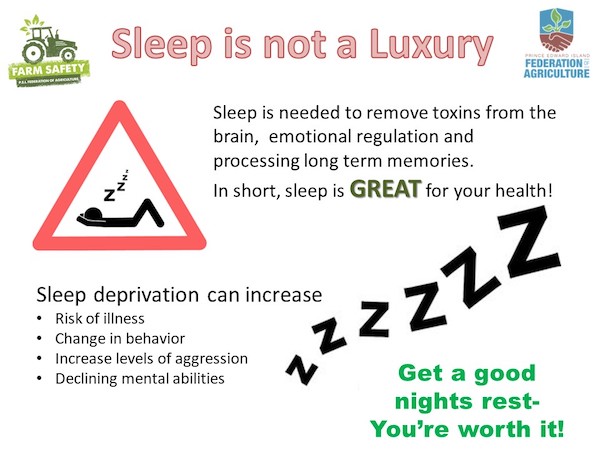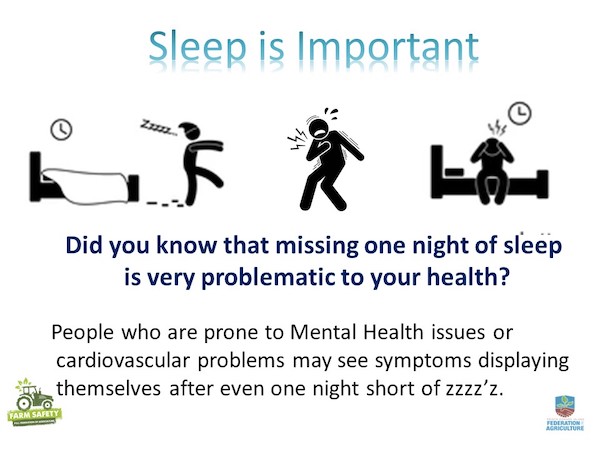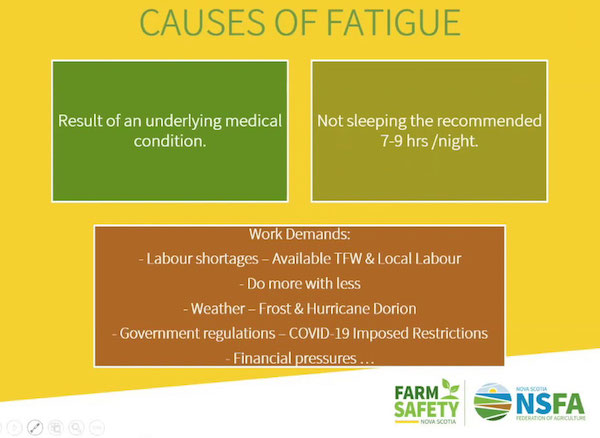Farming can be dangerous work. In fact, the profession ranks among the top ten most dangerous jobs in America. Too often, farmers are under tremendous pressure to carry on with planting, spraying, harvesting, calving, and the million other things that demand attention, even at the expense of their own well-being. Sleep is one of the most common sacrifices, which unfortunately tends to make people more prone to accidents and injuries. Insufficient sleep is also tied to anxiety, depression, high blood pressure, heart attack, obesity, and diabetes.
Susan Harris, Nebraska Extension educator, Institute of Agricultural and Natural Resources, and Amanda Prokasky, assistant professor of education and child development at the University of Nebraska Medical Center’s Monroe-Meyer Institute, recently wrapped up a study of agricultural workers and their sleep habits conducted from January 2021 to February 2022. The research was aimed at determining whether there was a need for more educational interventions to improve sleep among farmers and ranchers as a way to avoid accidents and injury.
According to the study, farmers and ranchers spent about 25 fewer minutes in bed and 28 fewer minutes actually sleeping each night during peak seasons. A half hour of sleep missed here and there may not be a big deal, but as Polansky explains, “when you start subtracting 30 minutes of sleep every night for four to six weeks during a busy season, that sleep deficit can become pretty significant.”
According to the American Academy of Sleep Medicine, side effects of sleep deprivation include lack of concentration, attention deficits, longer reaction times, distractibility, lack of coordination, poor decision-making, increased errors, and forgetfulness. According the U.S. Labor Department, the number one cause of farm accident fatalities is transportation incidents, specifically overturning tractors and heavy machinery. It’s not hard to connect the dots on those two, especially for anyone that’s ever driven while feeling the slightest bit sleepy. Other common farming accidents that result in injury or death include falls, toxic chemical exposure, suffocation, heat stress, and animal-related injuries.
A previous study National Institutes of Health (NIH) and the University of Nebraska Medical Center found that as net sleep decreased, farmers became less stable, even when standing on both feet with their eyes open. In fact, the odds of having reduced balance stability were 7.4 times higher when farmers slept fewer hours than normal the night before.
Grogginess, body aches and fatigue, confusion, decreased productivity, and irritability are indicators that your sleep schedule needs some attention. Harris and Polansky suggest farmers and ranchers make minor changes in work and sleep habits during peak busy seasons that could help offset the risk of potential accidents or injury. For example, taking brief breaks or naps during planting and harvesting season, or dairy farmers slightly changing their milking schedule, could make a difference.
Below are some tips and tricks compiled by UNL Extension for getting a better night’s sleep. The full list and more details are HERE.
- Get up at the same time every day and try to keep your sleep schedule as regular as possible.
- Try Sleep Restriction Therapy: Keep track of sleep hours for one week to figure the average number of hours slept per night. Then allow only that number of hours in bed per night for one week, adding 15 minutes of sleep each week until you wake up before an alarm. This regulates your sleep cycle to prevent waking in the middle of the night.
- Create mental triggers before bedtime like we do for children: have a warm bath, read a book, eat a light snack, put on pajamas, or create a to-do list for the next day so your head is clear of those things.
- Wear non-restrictive clothing or none at all. Anything that tangles around you when turning over in bed, pushes against your bladder, or creates too much heat must GO.
- Set nighttime temperature at 60-68 degrees. Bodies must cool down for good sleep. Vasodilation, or blood vessels dilating, carries heat to the skin in waking hours and then skin will cool down, signaling the brain that it is time to sleep.
- Persistently cold feet can interfere with you ability to fall asleep. Place a hot water bottle heating pad, or corn bag at your feet unde the covers if socks don’t warm them enough.
- Focus on sleep position—spine aligned, arm and legs not bent much, no leg-stacking. Sleeping on your back is best unless you have sleep apnea. The left side is next best for digestion and waste elimination (keep spine aligned and arms not kinked), the right side is third best, and on your front is worst (it kinks the neck, flattens spine leading to back pain, and restricts your airway/breathing).
- Change pillow or mattress plushness—fat pillows are only good for propping up to read and nothing else; try a pillow between your legs for hip support.
- Once in bed, do a body inventory. Focus on one body part at a time from head to toes and
- relax each one. Remember the key and always come back to it… Relax your jaw and remove tongue from the roof of your mouth.
- Talk to your physician about a blood test to determine iron level, or discuss any current meds that may affect sleep. Sometimes, just taking medicine at a different time of day makes a difference.








